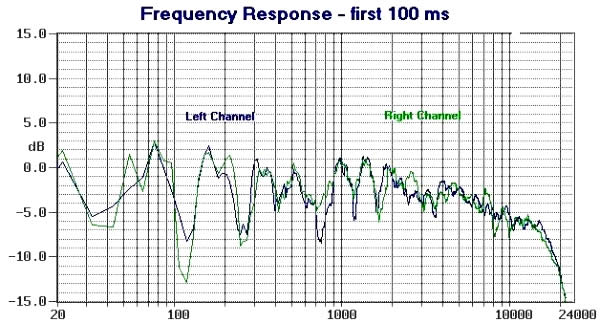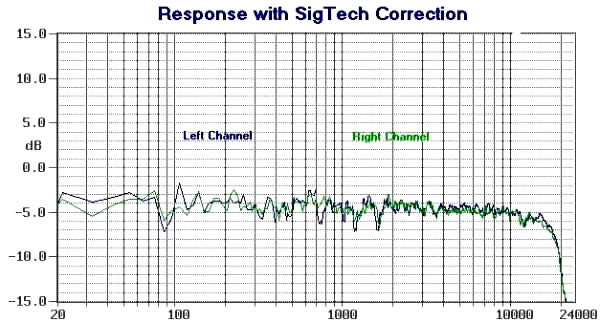TECHNOLOGY of the Sigtech AEC is based on principles developed for radar to cancel spurious reflections by means of adaptive filters. In our case, sound reflections introducing coloration are corrected through very high speed adaptive filters with DSP technology. These compensate independently the initial response and delayed reflections—for time-domain correction.
ANALYSIS. Our AEC1020-B (Set-up unit) sends test signals through the audio system, making comprehensive measurements of the response in the listening area. Graphic displays are produced from which the response of each monitor and the effects of room boundaries and equipment can be seen.
CORRECTION. The system adaptively designs, from a noise burst, the digital filter to compensate for detected errors. The installer can make adjustments to optimize for the size of the listening area, and to make signal arrival times identical. Results are viewed by a display comparing corrected vs. uncorrected measurements, and by an instant A-B listening test. Usually, there is a major improvement in frequency response by compensating for console and wall reflections, and a remarkable imaging correction from the channel-to-channel symmetry which it produces.
OPTIONS. Four different correction filters can be stored and selected by the optional remote control. The target response can be neutral (flat), one of the 9 pre-set responses (e.g., SMPTE-X), or one custom-designed by the user. Analog I/O or digital I/O or both are optional, with balanced, single-ended and optical formats.
PRICING. AEC models range from $4600, including room response measurements and installation which I handle as SigTech's regional Consulting Engineer. With my background in studio monitor and control room design (JBL) and acoustics (DISNEY IMAGINEERING), I believe I can provide some helpful insight as well.

Before-after curves demonstrating
the detailed corrections of the AEC.

Studio monitor speakers
in control room with acoustic effects introduced by room geometry.

Same studio monitor speakers
under identical conditions, after application of AEC correction.
The AEC 1000 is a powerful digital filtering system designed to correct loudspeaker and room response in critical monitoring applications. The AEC's filters are designed directly from a test signal, using proprietary algorithms to deal with both time and frequency response irregularities.
Full function wired remote control provides access from the listening position to four sets of stereo filters, along with bypass capability. Input selection plus level monitoring and adjustment can also be controlled remotely.
An external PC type computer and the AEC software are required for set-up. This system provides means for measuring and automatically generating digital filters, serving as well as an acoustical measurement and analysis system.
Electrical:
DIGITAL FILTERING UNIT
Inputs
Analog: Balanced female
XLR
Impedance: > 15
kW balanced
Sensitivity: adjustable
-4 dBu to +24 dBu for full-scale (20 bit) modulation
Single ended RCA
phono
Impedance: 10 kW
unbalanced
Sensitivity: adjustable
-8 dBu to +20 dBu for full-scale (20 bit) modulation
CMRR: > 80
dB from 20 Hz—1 kHz, >60 dB from 20 Hz—15 kHz
Microphone : Balanced
female XLR
Switchable +48
V phantom
Inverting Gain
20 dB min, 50 dB max
A/D: 20 bit sigma-delta
type
Frequency Response:
@ 44.1 kHz rate, 10 Hz to 20,700 Hz +0 dB, -0.5 dB
Frequency Response:
@ 48.0 kHz rate, 10 Hz to 22,500 Hz +0 dB, -0.5 dB
THD+n: > 99.0 dB
below full scale (dBFS) unweighted
THD+n: > 83.0 dB
below full scale -20 dB unweighted
THD+n: > 43.0 dB
below full scale -60 dB unweighted
THD+n: > 13.5 dB
below full scale -90 dB unweighted
Resolution @ 400
Hz: 20 Bits, -130 dBFS
Dynamic Range: 103 dB
for +12 dBu to +24 dBu sensitivity settings,
96 dB for -4 dBu
setting (worst case)
Digital: AES/EBU
XLR, transformer-coupled
S/PDIF RCA
phono
EIAJ Standard
Optical
Sampling Rates
40 to 50 kHz
Outputs
Analog: Balanced male
XLR, 50 W output impedance
Sensitivity: adjustable
-4 dBu to +24 dBu
Unbalanced RCA
phono, 100 W output impedance
Sensitivity: adjustable
-8 dBu to +20 dBu
Output DC: 5 mV from
+ to -, < 10 mV, + or - to ground
Balanced Output Symmetry
Error: -50 dB (IEC method @ 15 kHz)
D/A: 20 bit, 8 times
ovarsampling digital filter with noise shaping.
Frequency Response:
10 Hz to 22 kHz, + 0 dB, -0.5 dB
THD+n: > 92 dB
below full scale (dBFS) unweighted
THD+n: > 84 dB
below full scale -20 dB unweighted
THD+n: > 45 dB
below full scale -60 dB unweighted
THD+n: > 15 dB
below full scale -90 dB unweighted
THD+n measured
at 998 Hz, results unweighted, 10 Hz to 30 kHz.
Dynamic Range: 105 dB,
-4 dBu to +24 dBu setting
Digital: Adjustable Professional
and Consumer formats:
AES/EBU and XLR
transformer coupled
S/PDIF and
RCA phono
EIAJ Standard
Optical
Note: Outputs have muting
relays and provide hard-wire bypass when the AEC 1000 is powered down.
Digital Signal Processor
Digital Filter: Delay:
< 2.0 milliseconds
250 million instructions
per second DSP engine with 48/56 bit precision
2472 taps/channel
@ 44.1 kHz
2232 taps/channel
@ 48.0 kHz
Filter Memories: 4 sets
of filters in programmable FLASH memory. Unlimited storage available on
PC disk.
Program Memory: Firmware:
stored in FLASH memory, field upgrades under PC control.
THD+n: < -110
dBFS Bypass (Unweighted, digital in/out)
< -105 dBFS
typical with filter
Frequency Response:
20 Hz to 20 kHz ± < 0.1 dB
Miscellaneous
Power Consumption: 63
VA typical, with remote.
Dimensions: 2U rack mount
chassis, 8.9 cm ( 3.3") ´ 43.2 cm (17") ´ 33 cm
(13"), Weight: 6.8 kg (15 lb.)
REMOTE CONTROL
Functions: Display &
Select Input Source
Display & Adjust
Sensitivity
Peak Signal Level
Metering
Display & Select
Filter/Bypass
Dimensions: 2.5 cm
(1") ´ 31.7 cm (12.5") ´ 14.6 cm (5.75")
Weight: 0.7 kg
1.3 lb.
Cable: 7.6 m 25'
(0.43 kg 1.0 lb.)
PC INTERFACE
Card: 8 bit, half length
card with 37 pin AEC interface
Weight: 0.11 kg
0.25 lb.
Cable: 4.6 m 15'
SOFTWARE
AEC 1000 Control and
Analysis Software Package
· Measurement
and Calibration · Automated FIR Correction Filter Synthesis
· Filter
Configuration and Programming · Acoustical Measurement and Analysis
of:
· Impulse
Response · Frequency Response
· Frequency
vs. Time Analysis · Spectrum Analysis
Utility Functions
including user-defined target frequency response
WARRANTY
Hardware : One year parts
and labor warranty
Software: Updates provided
at no charge for one year from date of purchase.
Specifications subject
to change. This product is manufactured under US Patent 4,458,362.
Other US and foreign patents pending.
Prices range from about
$4500 to $13,000, depending on options such as software, computer interfaces,
number of filter memories, microphone and mic preamp, remote control, etc.
For information or to arrange an appointment for a demonstration of this powerful new technology, call the local area SigTech agent.
IN SOUTHERN CALIFORNIA
:
Drew Daniels (technical
sales representative)
URL: https://drewdaniels.com
Cambridge Signal Technologies,
Inc.,
60 Eddy Street - 3rd
Floor
Providence, RI 02903
Phone: 401.490.5684 (9AM
- 5PM, Eastern)